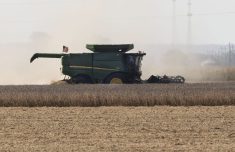The XL Foods shutdown in Brooks, Alta., hasn’t caused major spreads to develop between prairie slaughter prices and U.S. cash prices and futures.
If the XL problem can be resolved quickly, calf prices shouldn’t be affected much and other sectors of the cattle business should rebound, says Canfax.
“So far, calves have been holding in pretty good,” said Canfax senior analyst Brian Perillat.
“It’ll be good for the psychology of the market if Lakeside gets up and running again. For the fall run, it shouldn’t be too much of an impact at all.”
Read Also

Alberta harvest wrapping up: report
Harvest operations advanced to 96 per cent complete in Alberta as of Oct. 7, with only a few late-seeded cereal and canola fields remaining, according to the latest provincial crop report.
Perillat said the present spread between Canadian and U.S. fed cattle prices is actually less than it was a year ago, so it is hard to tell how much impact the XL shutdown is having on prairie cattle prices.
“It’s not devastating. The border’s still open,” said Perillat.
Prices for cull cows and yearlings have fallen as the Cargill plant in High River becomes glutted and feedlots hang onto fed cattle for longer, but if XL can get back into business soon, those should be temporary price phenomena.
“It’s not like we’ve got humongous numbers of cattle, either,” said Perillat.
“Obviously we’re going to get backed up for a little while, but the impact won’t be nearly as bad (if the plant soon reopens), just (to) get some confidence back into the market.”

















